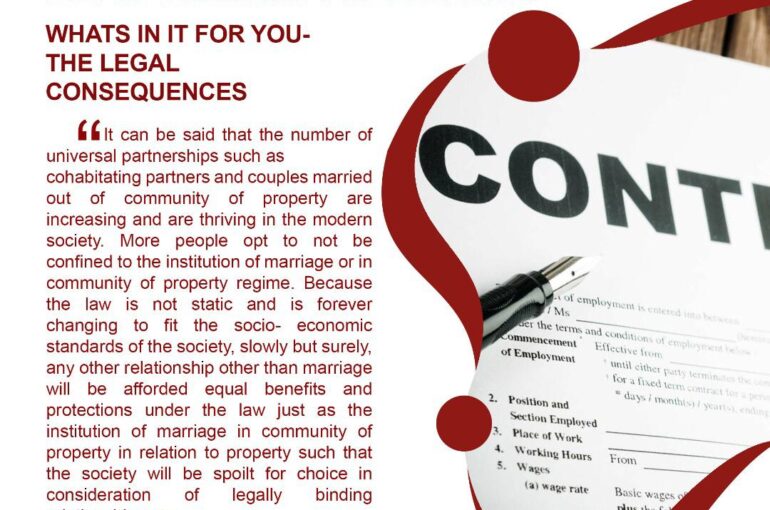Universal partnership’s such as cohabitation
UNIVERSAL PARTNERSHIPS? ARE YOU PROTECTED?
What is a universal partnership?
A universal partnership, simply put is an express or implied agreement between two parties, who intend to live together in a permanent intimate relationship without entering into a marriage or between two people who are married and have an express or implied intention to enter into an agreement in relation to their joint estate or estate acquired during the subsistence of the marriage.
Types of Universal partnerships recognised by our law in Botswana
This type of universal partnership applies only to spouses who have married in community of property,and they manifest their express intention by signing an instrument under the Married Person’s Property Act called “Form B”.
This type of universal partnership gives couples married out of community of property a right of recourse against each other to the extent of their contribution to the acquisition of each other’s estate. This partnership may also include cohabitating couples that intend on acquiring property together.
Right Of Recourse
Upon death of a spouse or a partner, or separation or divorce,a “partner” has a right of recourse against the other’s estate, provided they can prove that a universal partnership existed. For them to succeed, they must have satisfied three essential elements of a universal partnership;
Other determining factors include, the length of time the parties cohabitated and the type of relationship the parties had such that a reasonable person would infer that a universal partnership was created.
The onus of proof is placed on the partner that alleges entitlement to the contribution made to the acquired estate, in which such proof will be determined on a balance of probabilities. Therefore, the partner that alleges must prove through evidence provided at trial. The court will take into account the respective contribution of each partner towards acquiring the said property and divide it accordingly. The mere fact that the property is in the other spouse’s names, does not preclude the court from finding that the said property was jointly acquired.
Protections
Whereas couples married in community of property make their intentions clear by signing Form B, which has clearrights flowing from it, including joint ownership of the acquired estate, any person in a joint–partnership other than a marriage in community of property may take further steps inprotecting themselves by securing their contribution to the acquired property put in common or their partner’s interests in the acquired property, for example in instances of death of a partner. Such steps include;
Reducing your universal partnership terms into writing may solidify or show your true intensions, without any doubts, to enter into an agreement of this nature. The terms of the agreement may state how much the contribution may be, to what extent and the duration. This, however, may seem unrealistic and too formal ininstances of cohabitating partners, who chose to havetheir terms implied through conduct. It must be noted that it is difficult to prove before the courts of law when one party raises a case of entitlement. On the other hand, couples married out of community of property may express their terms of their universal partnership through a pre-nuptial contract, which is common in most jurisdictions.
Drafting a will for all intents and purposes, protects your surviving loved ones, including those you are in a universal partnership with. It protects their interests in the estate that the deceased leaves behind and even more, including the property they contributed in their acquisition during the subsistence of the marriage or relationship, failure which the law of intestate succession will take precedence, which in most cases does not favour universal partnerships.
It can be said that the number of universal partnerships such as cohabitating partners and couples married out of community of property are increasing and are thriving in the modern society. More people opt to not be confined to the institution of marriage or in community of property regime.Because the law is not static and is forever changing to fit the socio- economic standards of the society, slowly but surely, any other relationship other than marriage will be afforded equal benefits and protections under the law just as the institution of marriage in community of property in relation to property such that the society will be spoilt for choice inconsideration of legally binding relationships.



Leave a Reply